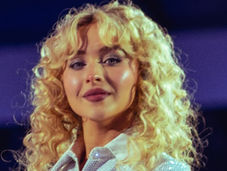'Fleabag': The Hit TV Show Takes On The National Theatre
- Callistajo Saputra
- Oct 17, 2019
- 3 min read
“Three nights ago I ordered myself a very slutty pizza,” Phoebe Waller-Bridge says with a smirk. The very first line of Waller-Bridge’s hit one-woman show Fleabag sets the tone of the entire show. Fleabag (her name is never explained) presents herself as a woman in control of her narrative—red lipstick always perfectly applied, chic bob slightly ruffled. However, we quickly learn that not everything is as it seems. Throughout the one-hour play, Waller-Bridge constantly flirts and deconstructs the conventional nature of performance art and stand up comedy. During most monologues, the audience would traditionally used as a tool before which a character bares their soul. In contrast, Waller-Bridge performs Fleabag as a woman who is putting on a brave front in order to cope with the grief of losing her best friend.

Phoebe Waller-Bridge as "Fleabag", Image courtesy of National Theatre Live
In the TV version of the show, Fleabag breaks the fourth wall in order to communicate with the audience. Meanwhile, in the stage show, Waller-Bridge capitalises on the unreliable narrator trope as she narrates Fleabag’s life entirely from her perspective. This was used to great effect, as it allowed Waller-Bridge to show off her expressive facial and vocal mimicry, as well as creating a feeling of false intimacy with the audience. In the introduction to the script of her play, she writes: “If there’s one thing I learned, it’s that you get a lot for free from an audience if you make them laugh. The power of comedy is astonishing to me—how it can disarm an audience and leave them wide open and vulnerable.” The line between comedy and tragedy is one that continuously becomes blurred throughout the show. As the play progresses, it's made clear that sarcasm is a tool weaponized by its central character to deflect from the emptiness Fleabag feels as a young woman struggling to find her place in modern society. Edward St. Aubyn, the acclaimed writer of the Patrick Melrose novel series, once said: “Irony is the hardest addiction of all. Forget heroin. Just try giving up irony, the deep-down need to mean two things at once, to be in two places at once, not to be there for the catastrophe of a fixed meaning.” This state of contradictions is one that Fleabag grapples with throughout the show as she longs for human contact, but her sexual depravity and cynicism ceaselessly make her fail to do so.

Phoebe Waller-Bridge in “Fleabag,” her one-woman show at the SoHo Playhouse. Photo Credit: Sara Krulwich for The New York Times
The play has been repeatedly branded as being "shocking" or "filthy", however, to merely focus on the frank descriptions of sex in the show would be missing the point. “I’m not obsessed with sex”, the central character says, “I just can’t stop thinking about it. The performance of it. The awkwardness of it. The drama of it. The moment you realise someone wants your body. Not so much the feeling of it.” Then, it becomes clear that her sexual bravado, like her sarcasm, is an unhealthy way of coping with her problems. She is obsessed with the validation and gratification that comes with sex, instead of the pleasure of it. This encapsulates Fleabag’s entire character; she doesn’t desire pleasure, but rather craves the attention and control it gives her.
Ultimately, Fleabag is a show about the universal search for lasting human connections. In the final moments of the play, she confesses her insecurities to a bank manager she forms an unlikely bond with and only then, she is able to come to terms with her guilt. It’s important to note that the last conversation she has is not one with the audience, but with a stranger who finally helps her to rebuild her life. It is as if the lasting point the show wants to make is that it is easy to make a performance out of depravity and to mask one’s pain with sarcasm and sexual gratification, but to push away pain means pushing away everything else that comes after it: optimism, hope, and joy. To truly connect with others, one has to do the hard work of being open and vulnerable. Maybe then, what seemed to be a cynical show turns into a hopeful one; as perfectly encapsulated by a line in the show: “People are amazing, but..when will people realise..that people are all we’ve got.”
Edited by Charlee Kieser, Deputy Digital Editor
























Comments